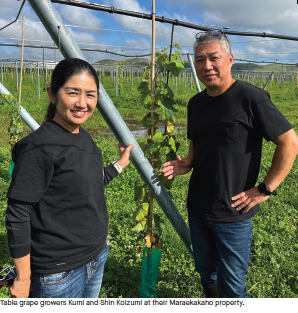Hawke’s Bay is renowned for award-winning wines, but super-sized table grapes grown on the Heretaunga Plains could fetch eye watering prices in high-end department stores in Tokyo, Japan.
In New Zealand 90 percent of grapes grown are for wine with 10 percent for eating, while in Japan it’s the opposite with a bunch of golf ball sized in-season grapes fetching over $100NZ. Shin Koizumi, is one of two Hawke’s Bay based table grape growers who are growing and exporting premium grape varieties to Japan, creating year round supply in the gift market sector.
For Shin he is reliving his childhood, when he spent summers picking grapes and cherries at his grandparents property in the grape growing region of Yamanashi. He would pick and pack the grapes and cherries into big crates to give to his junior school friends. “Gifting food makes people very happy, both for those that gift and those that receive and I loved giving my class mates freshly picked grapes and cherries.”
In Japan table grapes are like Bluff Oysters are to Kiwis – a luxury high-end seasonal product that excites consumers when they see them instore. Shin was looking for a career and lifestyle change, away from the hustle and bustle of downtown Tokyo.
As a successful real estate agent for Japan’s leading real estate firm Mitsui Fudosan, Shin was keen to go back to his family roots as a grape grower and put his talent for find a suitable property to use. He could see there was an opportunity for creating a year round supply of high-end table grapes by finding a suitable Southern Hemisphere growing climate for varieties such as Shine Muscat, Violet King and YuHo, all large seedless grapes under its Goku Shun brand to year round.
He first visited Hawke’s Bay in 2015 as part of researching potential southern hemisphere growing areas to complement the Japanese harvest season, spending time with Japanese grape master Tetsuya Higuchi who had established a table grape orchard in Clive.
Table grape growers Kumi and Shin Koizumi at their Maraekakaho property. Tetsuya is one of the top growers in Japan, producing table grapes for the high-end market, and like Shin wanted to supply grapes all year. Shin says after looking at South Africa, Chile, Australia and New Zealand, he and his business partners who established GREENCOLLAR decided on Hawke’s Bay.
“We wanted a more relaxing lifestyle away from commuting by train into Tokyo, spending all day in meetings and only making it home to get some sleep.” For Shin, it was about creating a new lifestyle – one that wasn’t blue nor white collar and instead a “green collar” lifestyle that his employers would also embody.
The core concept is living in a more human and humane way, in tandem with nature and the emblem of that idea is the GREENCOLLAR brand, which is a move away from notions of blue collar or white collar and advocating a new way of living balancing work, residential life and leisure. Shin and the GREENCOLLAR project team liked what they saw in Hawke’s Bay, it offered them the ideal outdoor lifestyle they yearend, after looking at many properties they settled on a 10 hectare Maraekakaho vineyard property in 2020. He convinced Mitsui Fudosan to go into partnership to launch Greencollar New Zealand Limited, the company that provides the cultivars, grows and markets table grapes under the brand name Goku Shun.
“We looked at South Africa, Chile and Australia too, but New Zealand as it is closer to the Asian market. The property purchase took until April 2021 to be finalised through the Overseas Investment Office and due to COVID19 and planting has been slower than planned due to labour availability and closed borders.
“We were very lucky that we had some kind neighbours that have helped us with the planting as well as introducing us to contractors to get posts in the ground.”
Hastings District Council economic development manager Lee Neville says the emergence of new food product and export market is exciting for the region. Council supported Shin’s OIO application with a supporting letter from Mayor Sandra Hazlehurst.
“We could see the potential of a new fruit product and brand into Japan, which is a relatively small market for our region up until now. Hastings and Hawke’s Bay have a reputation of growing apples, and producing quality wine but if we can diversify into new emerging markets, then this will have a positive impact on the economy. As well as table grapes being exported to Japan, the export of strawberries, which are being grown in a mega 22,000m2 glasshouse in Clive, by another Japanese-owned company Tatsumi NZ Limited. A glasshouse, which is about the size of three football fields can produce up to 10 tonnes of strawberries every month, equating to supplying millions of strawberries each year to Japan. Shin is confident that the Hawke’s Bay versions of grapes like Voilet King will be superior to the Japanese equivalent.

He says the Hawke’s Bay climate with higher sunshine hours, a wider range of high and low temperatures and ideal rainfall will see grapes that have 1.8 times more polyphenols and 50 – 70 times more resveratrol than Japanese-grown grapes. He also plans to use organic growing practices but needs to find an organic scientific solution for making the grapes seedless.
A noticeable visual difference of growing traditional style Japanese grapes, is the growing of each bunch of grapes within a waxed paper bag which is then covered by an individual weather proof umbrella.
“The secret to what makes our grapes so delicious is something not found in conventional grape plantations which sees the arrangement of grape branches carefully calculated during winter, and the leaves are scrupulously pruned and thinned to enable the grapes to obtain ample nutrients, creating a better flavour.
“Sunlight is allowed to trickle through gaps in the grape leaves making the grapes sweeter, more fragrant and darker colour. “It is a very old traditional growing practice that is very labour intensive, accounting for 70 percent of the production costs,” he says.
This coming harvest will see about 200 bunches grown as a trial test (will not be sold) and next year on peak harvest from (year) up to 180 tonne of grapes will be exported. Although currently hand-picked, Shin hasn’t ruled out robotics and has set out each row to be 4 metres apart, wide enough for automated picking units.
As production grows from both his vineyard and Tetsuya’s, Shin is already in talks with Hawke’s Bay Airport and air freight providers to fly fresh grapes direct to Tokyo within 24 hours. To make it financially feasible to export direct to Japan Shin has looked to extend the air freight service to include other Hawke’s Bay grown fresh fruit.



